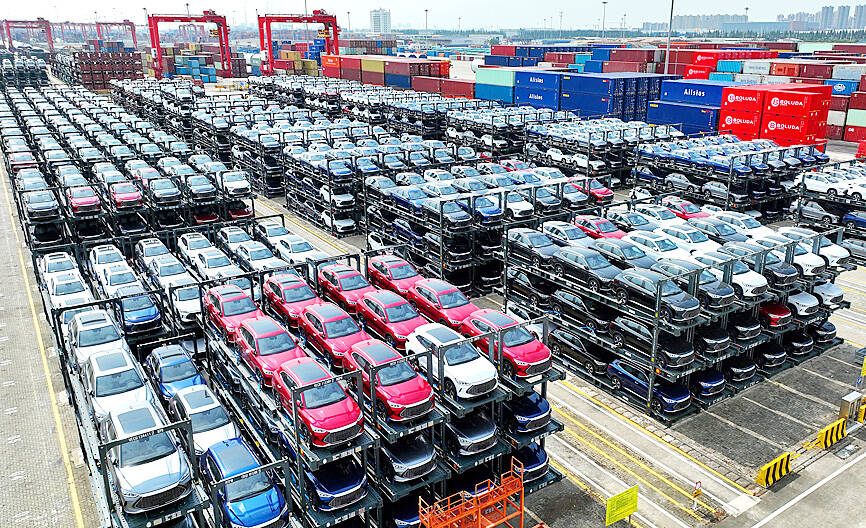Nissan Motor Co is considering reducing production capacity in China 30 percent, while Honda Motor Co intends to cut 20 percent, the Nikkei reported yesterday.
The Japanese automakers are struggling in the face of increased local competition from manufacturers such as BYD Co (比亞迪) as electric vehicles (EVs) take hold in China, the newspaper reported, without saying where it got the information.
Honda’s output last year was about 1.2 million units versus capacity of 1.49 million, so there is room to rationalize, a spokesperson for the company said.

Photo: AFP
A representative for Nissan was not immediately available for comment.
Honda and Nissan sales in China have been falling for at least three years, while Toyota Motor Corp’s has been mostly flat. The main issue has been the lack of attractive EV offerings from the trio.
Japanese vehicles are mostly produced and sold through joint ventures with local partners. Guangzhou Automobile Group Co (廣州汽車集團) has partnerships with Toyota and Honda, while state-backed Dongfeng Motor Group Co (東風汽車集團) has ventures with Honda and Nissan.
Nissan might cut annual production capacity by as much as 500,000 units from the current level of 1.6 million, the Nikkei reported.
Honda is looking at reducing annual output to about 1.2 million units, the newspaper said.
Separately, Xiaomi Corp (小米) announced it would start selling its long-awaited EVs this month as the electronics firm breaks into the red-hot contest in China’s EV market led by Tesla Inc and BYD.
The Beijing-based Xiaomi, best known for its smartphones, plans to offer its SU7 series for purchase on March 28 and March 29, it wrote in a Sina Weibo post yesterday, without disclosing pricing.
The SU7 name stands for “Speed Ultra,” and the vehicles can go from 0 to 100kph in 2.78 seconds, Xiaomi said.

When an apartment comes up for rent in Germany’s big cities, hundreds of prospective tenants often queue down the street to view it, but the acute shortage of affordable housing is getting scant attention ahead of today’s snap general election. “Housing is one of the main problems for people, but nobody talks about it, nobody takes it seriously,” said Andreas Ibel, president of Build Europe, an association representing housing developers. Migration and the sluggish economy top the list of voters’ concerns, but analysts say housing policy fails to break through as returns on investment take time to register, making the

NOT TO WORRY: Some people are concerned funds might continue moving out of the country, but the central bank said financial account outflows are not unusual in Taiwan Taiwan’s outbound investments hit a new high last year due to investments made by contract chipmaker Taiwan Semiconductor Manufacturing Co (TSMC, 台積電) and other major manufacturers to boost global expansion, the central bank said on Thursday. The net increase in outbound investments last year reached a record US$21.05 billion, while the net increase in outbound investments by Taiwanese residents reached a record US$31.98 billion, central bank data showed. Chen Fei-wen (陳斐紋), deputy director of the central bank’s Department of Economic Research, said the increase was largely due to TSMC’s efforts to expand production in the US and Japan. Investments by Vanguard International

WARNING SHOT: The US president has threatened to impose 25 percent tariffs on all imported vehicles, and similar or higher duties on pharmaceuticals and semiconductors US President Donald Trump on Wednesday suggested that a trade deal with China was “possible” — a key target in the US leader’s tariffs policy. The US in 2020 had already agreed to “a great trade deal with China” and a new deal was “possible,” Trump said. Trump said he expected Chinese President Xi Jinping (習近平) to visit the US, without giving a timeline for his trip. Trump also said that he was talking to China about TikTok, as the US seeks to broker a sale of the popular app owned by Chinese firm ByteDance Ltd (字節跳動). Trump last week said that he had

STRUGGLING TO SURVIVE: The group is proposing a consortium of investors, with Tesla as the largest backer, and possibly a minority investment by Hon Hai Precision Nissan Motor Co shares jumped after the Financial Times reported that a high-level Japanese group has drawn up plans to seek investment from Elon Musk’s Tesla Inc to aid the struggling automaker. The group believes the electric vehicle (EV) maker is interested in acquiring Nissan’s plants in the US, the newspaper reported, citing people it did not identify. The proposal envisions a consortium of investors, with Tesla as the largest backer, but also includes the possibility of a minority investment by Hon Hai Precision Industry Co (鴻海精密) to prevent a full takeover by the Apple supplier, the report said. The group is